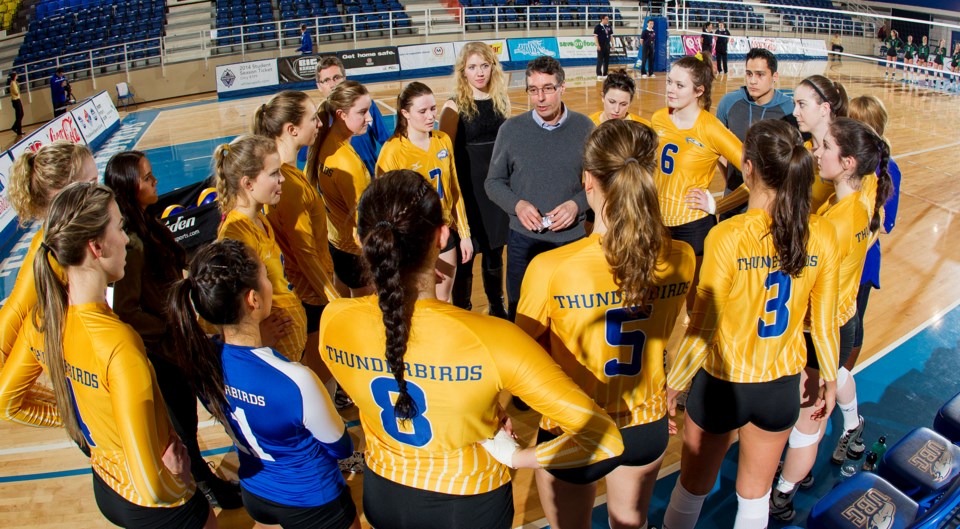At the start of his 18th season as the head coach of the Thunderbirds women’s volleyball program, Doug Reimer had a win percentage of .792. He had won a record six consecutive national championships between 2008 and 2013 but lost last year’s final to Manitoba. Under his guidance, a UBC athlete has been named the best female university volleyball player in the country for the past five years.
At the annual B.C. Sport Conference in January, Reimer, a five-time CIS coach of the year, will discuss his coaching philosophy and how team chemistry creates confidence, a factor important at all levels of sport.
Before Reimer and the T-birds hit the road Nov. 6, the Courier caught up with him by phone. He was at YVR.
You appear on the website , showing simple and effective improvements to basic drills. Aren’t you afraid of giving up all your secrets?
Doug Reimer: Definitely not. You can add that I’m laughing here! The only way the sport grows and the level of skill grows is if you share. To be honest, I don’t think there are many secrets out there. I do this as a profession. There are a lot of coaches that do this as a part-time hobby and, in the long run, this this is better if certain philosophies are shared.
You’ll be talking about team chemistry at the Sport B.C. Conference. How do you get a team to bond?
Reimer: To me it’s a fascinating topic. There’s a number of components: you’ve got to start with attracting good people to the program because every team, they are going to go through adversity, so sometimes it’s not always just about talent or Xs and Os. In a team sport, ours for sure, the ability of the group to push each other but also support each other is important and, I think, to feel almost a kind of faith. If you don’t have that overall environment and culture to do that, it’s really hard to build trust between the players and between the staff and players. If you don’t have trust, things are going to break own on and probably off the court.
You’re asking for total commitment.
Reimer: It is not a formula. It takes constant work but the people who are involved, they have to be wanting to continue to learn and get better.
What have you learned from other coaches?
Reimer: I’m stoked with the presenters who are there [at the Sport B.C. Conference]. I am humbled to be in the same group as them. To me, you need these things because coaching, it’s a constant. It doesn’t got away, it’s not a nine-to-five kind of job. Being able to listen to Rick Hansen talk about leadership is very motivating. I think the other thing it does, is it makes you look at the big picture, not just your own group or some of the technical or tactical problems you’re having it’s a great reminder that being a coaches extends above and beyond wins and losses. You cannot get into coaching and ignore that. If you do, you are in the wrong profession.
Besides raw talent, what characteristics do you assess when you’re recruiting?
Reimer: I think it links back to the culture that you want to create. I’ve learned over time not to get too excited over talent alone. This has been shown to me by a number of athletes. I try and be as honest as I can with recruits. There are times I’ve said, right now there are other people in that position who will get more playing time. Some of those individuals have shown me their own perseverance and their ability to keep improving over time and have surpassed what I thought early on.
I really think that being open to not being the best right away is important because very few players come in to university and dominate the way they have in their high school or club experience. How well they embrace that challenge and how they are able to push themselves through, those are the ones that have a maturity about their own position and their ability to lead and help others and making a huge influence and being able to carve out strong roles.
As a team, I think now I look more at things like character that they are going to bring. In terms of work ethic, how they will contribute to the other people on the team, how they will accept certain roles. If you don’t have some of those individuals, then it’s my experience you won’t build a true championship team, at least not on a consistent basis.
Do you pass on raw talent if you fear those traits won’t ever develop?
Reimer: Oh yeah. We have. It could have been that individual but it could also be that once we’ve made a commitment to athletes that are older, we try and honour that and not over-recruit in a particular position. It’s a very fine balance. I really want to stress, it is hard to predict how that is going to go. It’s inexact and every week and every year it’s is a fresh challenge.
Reimer will present at the B,C, Sport Conference Jan. 10 in Burnaby.
This interview has been condensed.



